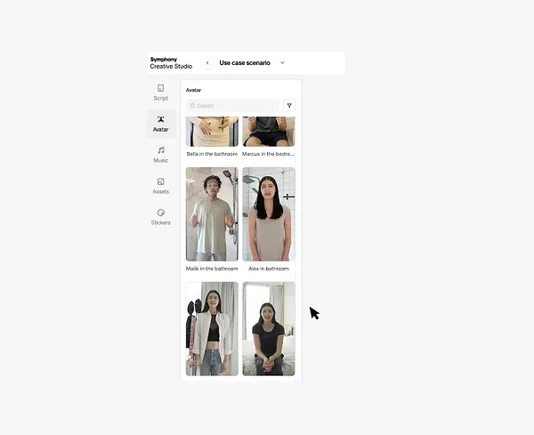The next phase of digital marketing is coming to TikTok, with the platform's new marketing management platform, Symphony, set to include new options that allow brands to deploy virtual influencers to sell their products within the app.

As this example shows, TikTok is now taking its virtual influencer program to the next level, allowing brands to choose from a range of digital characters to sell their products 24/7 via TikTok live streams.
As the TikTok description states:
“To help creators and brands engage audiences around the world and deliver their impactful messages in immersive and authentic ways, we’re excited to announce the following: Symphony Digital Avatar. Digital Avatars bring branded content to life with AI-generated avatars of real people, enabling new ways to expand your creative strategy on TikTok.”
Digital avatars on TikTok come in two forms.
- Stock Avatar – Pre-built characters created using paid actors licensed for commercial use
- Custom Avatar – Creators and brand spokespeople can also create avatars in their own likeness, complete with multilingual capabilities.
That sounds strange, right? It seems like it would result in some obviously fake, ridiculously robotic avatars that would be completely unconvincing as digital salespeople within the app.
But like all TikTok innovations, the concept is actually already sophisticated enough that the same digital avatar is already a viable and worthwhile option on the Chinese version of the app, called “Douyin.”

In fact, AI hosts like the one pictured above are so popular in the Chinese market that these simulated characters can stream 24/7, sometimes selling thousands of dollars worth of merchandise every day.
It is also becoming increasingly cost-effective.
As reported by MIT Technology Review:
“Since 2022, a wave of Chinese startups and big tech companies have been offering to create deepfake avatars for e-commerce livestreaming. With just a few minutes of sample video and a fee of $1,000, brands can replicate a human streamer and have them work 24/7.“
These AI clones are designed to mimic the words of advertisers’ scripts, and companies are also using AI to generate the scripts.
“Now, all a human worker has to do is enter basic information like the name and price of the product being sold, proofread the generated script, and watch the digital influencer go live. A more advanced version of the technology can detect live comments and find matching answers from a database to respond in real time, making it appear as if the AI streamer is actively communicating with their viewers. It can also adjust marketing strategies based on viewer numbers..”
And now they're coming to TikTok, with simplified creation options offering new ways for brands to market their wares to the TikTok community through both ads and livestreams.
Is this a future direction and something we'll see in all apps going forward?
After all, Instagram is already experimenting with something similar, allowing creators to build AI chatbots that look just like them.
And considering China already has virtual characters selling goods, this seems like it could be a big change. It might not be an immediate transformation, but as AI technology continues to advance and bot options like this become more realistic, this could be the direction of the future.
Hey, remember those NPC streams on TikTok where real people pretend to be digital characters?
Clearly, they were more suggestive than they appeared.


